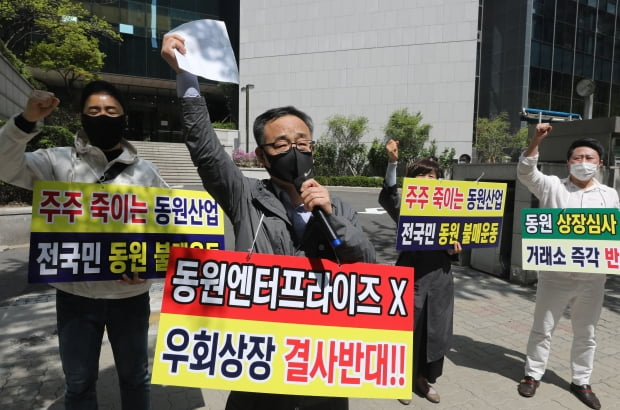
Some individual shareholders of Dongwon Industries protest against the group’s restructuring plan A South Korean leading seafood and logistics conglomerate Dongwon Group’s corporate restructuring plan hit a roadblock as institutional investors actively opposed the strategy, which they said is expected to hurt shareholder value.The group is set to undergo the restructuring with Dongwon Industries Co. emerging as its new holding company. The group plans to absorb unlisted Dongwon Enterprise Co., the current de facto holding company, into Dongwon Industries.The group estimated the share price of Dongwon Enterprise to be 191,130 won ($154.9) and that of Dongwon Industries at 248,961 won as the basis for the merger of the two companies.Institutional investors such as Blash Asset Management Co. that hold stakes in Dongwon Industries have been preparing measures against the merger together, according to industry sources on Wednesday. Those shareholders said the merger ratio was “unreasonably” calculated after the group announced the plan.“UNREASONABLE” CALCULATION OF MERGER RATIOThe institutional investors requested Dongwon Industries to calculate the merger ratio again while considering submitting written opinions to related authorities such as the Korea Exchange and the Financial Supervisory Service. The KRX will review Dongwon Enterprise’s backdoor listing and the FSS will oversee the registration statement.“It is an unusual step for a blue-chip listed company to absorb a holding company that does not have an actual business,” said a source in the local asset management industry. “Shareholders that have 1% or more of its stake have already joined hands to meet requirements of a derivative suit while trying to talk with the company before filing a lawsuit.”Dongwon Enterprise on April 7 filed an application for a preliminary review of a backdoor listing. Dongwon Industries was set to conduct a five-to-one share split to make the stock more widely available for retail investors. Under the plan, the face value of a Dongwon Industries stock will change from 5,000 won to 1,000 won.Taking into account the share split, Dongwon Industries’ board of directors decide the merger ratio at 1 to 3.84.Dongwon Group founder and honorary Chairman Kim Jae-chul currently owns 24.5% of Dongwon Enterprise, while his second son Kim Nam-jung, vice chairman and de facto leader of the group, holds a 68.27% stake in the holding company.Dongwon Enterprise is the largest shareholder of Dongwon Industries with a 62.72% stake, but the planned merger is predicted to allow the vice chairman to control the new holding company with an expected stake of 48.43%.UNDERESTIMATES DONGWON INDUSTRIES?The merger ratio sparked a controversy over the calculation of values of unlisted Dongwon Enterprise and a Kospi-listed Dongwon Industries. Institutional investors said Dongwon Industries’ value was underestimated while that of Dongwon Enterprise was overvalued.Those shareholders were paying attention to Dongwon Industries’ stock that traded below its net asset value.“Under the capital markets act, Dongwon Industries could select a higher one between the market price (stock price) and the net asset value as a merger price, but the company chose the market price,” said Kim Hyung-kyoon, managing director of Tcha Partners Asset Management Co. “An independent board of directors must not decide on a merger based on such a valuation calculation.”Such resistance baffled Dongwon Group, which planned to streamline its corporate governance, speed up decision making and increase the number of outstanding shares through the restructuring.A Dongwon Industries source said the capital markets act provides the basis for the application of the net asset value instead of the stock price for the calculation of a listed company’s valuation, but the law does not have separate rules on the reasons, methods and procedures that require the net asset value.“It is hard to accept some arguments that the merger price based on the stock price is arbitrary,” said the source.POSSIBLE VIOLATION OF COMMERCIAL LAWThe merger may also violate a commercial law that emphasizes the fairness of a transaction with major shareholders, legal sources said.“The company needs to prove the fairness of the transaction under the commercial law, but there is no related information in any documents including the minutes of the board of directors’ meeting. That could be illegal,” said Korean Corporate Governance Forum Chairman Kim Kyu-shik, a lawyer.Some shareholders doubted if the merger could create synergy.“Given the growth potential of StarKist, Dongwon Industries’ corporate value is expected to increase much further. I cannot understand the reason for the merger with the holding company,” said a source at one of the institutional investors. StarKist Co., a major US tuna supplier, was acquired by Dongwon Industries in 2008.“The company should prove that the merger has a synergy effect enough to offset shareholder value losses.”By Soo-Jung Haagatha77@hankyung.comJongwoo Cheon edited this article.
Most Read